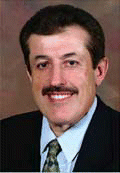The success of functional endoscopic sinus surgery (FESS) often depends on patient selection and expectations, according to several experts.
Explore This Issue
August 2008As otolaryngologists know, FESS is typically not a cure for chronic sinus disease. More often, it is a tool that helps long-term medications work more effectively. The mission is to make certain that patients understand and accept the surgery’s limitations. ENT Today conducted separate phone interviews with experts who presented a panel on FESS surgery failure at recent Triological Society section meetings. In the interviews, they discussed the reasons for FESS failure, predictive factors, preventive strategies, and ways to proceed after the surgery fails.
Goals of Sinus Surgery
I define the goals as symptom improvement and improvement of the disease itself, said John DelGaudio, MD, Associate Professor of Otolaryngology and Chief of Rhinology and Sinus Surgery at Emory University School of Medicine in Atlanta. If you take those things into account, failure can occur for different reasons.
Michael J. Sillers, MD, Director of the Alabama Nasal and Sinus Center in Birmingham, said that the surgery is considered unsuccessful if the patient has persistence, recurrence, or worsening of sinus symptoms or disease after sinus surgery.
Incomplete surgery, scar tissue formation, discontinuation of medical therapy, or disease progression can be reasons for FESS failure, Dr. Sillers said. Surgery can’t halt the natural history of the disease, so the precise role of surgery needs to be clearly understood.
FESS would be considered unsuccessful if after surgery, the patient still has symptoms that influence the quality of life and still has objective disease as documented by the exam or CT scan, said Stilianos Kountakis, MD, PhD, Vice Chair of Otolaryngology at Medical College of Georgia in Augusta, where he is Co-Director of Rhinology-Sinus Surgery. The main issue is how the patient feels, though, he stressed. I’m not treating the imaging study, I’m treating the patient, he said.
Dr. Kountakis agreed with Drs. DelGaudio and Sillers that an important first step is to understand the underlying problem. There are many different reasons for chronic rhinosinusitis, he said. Most of the time it’s not an infection, but inflammation due to several causes. Allergic rhinitis in patients with chronic rhinosinusitis should be treated appropriately to minimize all sources of sinonasal inflammation. Patients with allergic fungal rhinosinusitis require surgery to remove the fungal debris, and they require aggressive medical management afterward. Bacteria in the sinuses that produce toxins can cause severe inflammation. Others may have a genetic predisposition to sinus disease, as in patients with asthma.
 Explain to patients that they are having surgery because their disease can’t be managed with medications and that the goal of surgery is to make the disease manageable with medications again.
Explain to patients that they are having surgery because their disease can’t be managed with medications and that the goal of surgery is to make the disease manageable with medications again.-Brent Senior, MD
Patient Selection and Counseling
Helping patients understand the nature of [sinus] disease is a critical component of preventing their disappointment in FESS, said Brent Senior, MD, Chief of Rhinology, Allergy, and Sinus Surgery at the University of North Carolina in Chapel Hill. It’s critical for patients to understand that chronic sinus disease is a disease that is always with you, that it can wax and wane in severity. Surgery can make it a milder disease to live with, but it does not necessarily cure the sinus disease.
Informed consent should include any possible complications, as well as the expected outcome of the surgery. Patients will be more likely to comply with medications and not be frustrated with the ongoing need for medications if they know this is likely ahead of time, Dr. Senior said. Explain to patients that they are having surgery because their disease can’t be managed with medications and that the goal of surgery is to make the disease manageable with medications again.
 There are many different reasons for chronic rhinosinusitis. Most of the time it’s not an infection, but inflammation due to several causes.
There are many different reasons for chronic rhinosinusitis. Most of the time it’s not an infection, but inflammation due to several causes.-Stilianos Kountakis, MD, PhD
Dr. Senior said that FESS failures are typically due to one of two problems. First, the surgeon may not have taken the patient’s anatomy fully into account, so that inadequate tissue is removed, or the surgery is not adequate for treating a patient’s particular disease. Technical surgical problems can occur intraoperatively, also. Second, some patients have aggressive disease that doesn’t respond to even good surgery.
Therefore, the surgeon should be alert to patients with recalcitrant disease, whose computed tomography (CT) scans often predict worse FESS outcomes, he said. If the CT is a complete white-out, with the sinuses completely blocked and inflamed, the patient will do less well with surgery, will have more surgeries in the future, and will require more medications, he said.
Dr. DelGaudio agreed. The surgeon should make sure that the underlying disease would respond to FESS. If the patient undergoes surgery for a reason not due to sinus disease, the symptoms may not improve postoperatively, Dr. DelGaudio said.
For example, for primary headache, FESS would be a poor approach. A good percentage of patients diagnosed with sinus headache have underlying migraine, Dr. DelGaudio said. Therefore, a patient with headache in and of itself is not a good candidate for FESS. Similarly, postnasal drip without significant sinus symptoms is not an indication for FESS because acid reflux may be the underlying problem.
The most common indication for FESS is chronic inflammatory disease of the sinuses that is not responsive to maximal medical therapy, including antibiotics as well as topical and systemic steroids, Dr. DelGaudio said. Another major indication is acute complications of sinusitis.
The burden and extent of the patient’s preoperative disease can help predict the success of the surgery, according to Dr. Sillers. We separate patients into those with and without polyps, and those with polyps tend to do worse, he said.
Preventing Failure
The best way to prevent FESS failure is in the quality of the surgery, according to Dr. Senior. We get caught up talking about FESS failure from the medical standpoint, he said. We need the right regimen of medications to keep them feeling well after the surgery, but good, high-quality surgery can make a difference, even in the patients with severe disease. Such surgeries would involve meticulous, mucosal-sparing procedures with removal of all ledges and septations in the particular inflamed sinus cavity.
Dr. DelGaudio agreed. If the obstruction is not adequately relieved, the sinuses inadequately opened, and the underlying disease not addressed by the surgery, the likelihood of failure is increased, Dr. DelGaudio said. One of the most frequent reasons for frontal sinus surgery failure is inadequate control of disease in the frontal recess.
The challenge is to preserve as much of the healthy mucosa as possible to prevent stenosis or scarring while performing a complete surgery to allow adequate ventilation of the sinuses.
Failures can also occur in people who were appropriate candidates and had persistent symptoms afterward. Such symptoms may be due to disease factors such as significant nasal polyps with aspirin sensitivity, allergic fungal sinusitis, advanced radiological disease according to Lund-McKay scores, or cigarette smoking.
Intraoperative Staging
The surgeon should also be alert to problems that become known intraoperatively, such as fungal rhinosinusitis, said Dr. Kountakis. Such patients are less likely to have satisfying outcomes, as are patients with high sinus tissue eosinophil counts. In his practice, the pathologist counts the number of eosinophils per higher power field for at least five different fields, and then averages them. Fewer than five per higher power field are associated with better outcomes than those with larger counts, he said.
Dr. Kountakis and his colleagues use intraoperative pathological findings to stage patients into one of four prognostic categories and treat them accordingly postoperatively.1 The first category consists of patients with polyps that have a high number of tissue eosinophils. Such patients will probably have recurrence and require more surgeries in the future, he said. They require more aggressive therapy, with longer steroid tapers, as well as additional intranasal and oral anti-inflammatory medications.
In the second group, patients have polyps but without high tissue eosinophilia; these patients receive shorter courses of medical therapy. The third group has mucosal involvement but no polyps, and does not require prolonged oral steroids. In the last group, which is most likely to have a good outcome after surgery, patients have no polyps, no mucosal involvement, and no sinus tissue eosinophilia. Their long-term postoperative management is typically limited to intranasal corticosteroid spray medication.
Individualize Postoperative Care
The postoperative regimen is not one size fits all, Dr. Senior said. Different patients will need different types of medications, and sometimes you have to test several medications on a patient to find what works best. This may involve the right antibiotic, steroids, an antihistamine, a leukotriene inhibitor, or combination therapy.
Dr. Sillers stressed that postoperative care may include appropriate early debridements in follow-up care, as well as ongoing medical therapy. These are important and can improve successful outcomes, he said. The physician needs to have the proper equipment, such as sinuscopes, to confirm that the sinuses are patent as they were at the time of surgery.
Inadequate postoperative care can result in three problems: lateralization of the middle turbinates, synechiae formation, and stenosis of the frontal recess, Dr. DelGaudio said. Postoperative medical or procedural interventions can include oral or topical steroids to address postoperative edema, dilation of the sinuses, and removal of scar tissue. The key is to recognize the postoperative events on which the surgeon can intervene and improve outcomes, he said.
Treatment after FESS Failure
After FESS failure, the next step may be either revision surgery or a change in medical therapy. The treating physician may not have tried certain medications before surgery, Dr. Senior said. Maybe more aggressive allergy treatment is appropriate, or an investigation into the patient’s immune system if the surgery does not result in some improvement.
If revision surgery seems to be appropriate, surgeons should proceed, he said. Fortunately, 80% to 90% of well-selected patients will get some significant benefit from revision surgery, he said.
In Dr. Kountakis’s practice, nasal endoscopy and sinus CT are used to formulate an individualized plan for revisions. Recurrent polyps are removed to reduce the mucosal inflammatory load and improve sinus ventilation and anatomic obstruction or problems are corrected. You can’t just go in and try to do revision surgery without understanding why primary surgery failed, he said.
Reference
- Kountakis SE, Arango P, Bradley D, Wade ZK, Borish L. Molecular and cellular staging for the severity of chronic rhinosinusitis. Laryngoscope 2004;114:1895-1905.
[Context Link]
©2008 The Triological Society
Leave a Reply